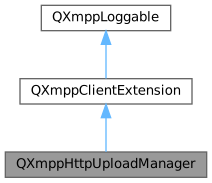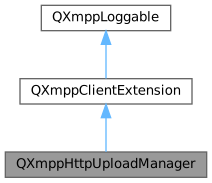Inheritance diagram for QXmppHttpUploadManager:

Collaboration diagram for QXmppHttpUploadManager:

Public Member Functions | |
| QXmppHttpUploadManager () | |
| QXmppHttpUploadManager (QNetworkAccessManager *netManager) | |
| std::shared_ptr< QXmppHttpUpload > | uploadFile (std::unique_ptr< QIODevice > data, const QString &filename, const QMimeType &mimeType, qint64 fileSize=-1, const QString &uploadServiceJid={}) |
| std::shared_ptr< QXmppHttpUpload > | uploadFile (const QFileInfo &fileInfo, const QString &filename={}, const QString &uploadServiceJid={}) |
 Public Member Functions inherited from QXmppClientExtension Public Member Functions inherited from QXmppClientExtension | |
| QXmppClientExtension () | |
| virtual QStringList | discoveryFeatures () const |
| virtual QList< QXmppDiscoveryIq::Identity > | discoveryIdentities () const |
| virtual bool | handleStanza (const QDomElement &stanza) |
| You need to implement this method to process incoming XMPP stanzas. | |
| virtual bool | handleStanza (const QDomElement &stanza, const std::optional< QXmppE2eeMetadata > &e2eeMetadata) |
| You need to implement this method to process incoming XMPP stanzas. | |
 Public Member Functions inherited from QXmppLoggable Public Member Functions inherited from QXmppLoggable | |
| QXmppLoggable (QObject *parent=nullptr) | |
Additional Inherited Members | |
 Signals inherited from QXmppLoggable Signals inherited from QXmppLoggable | |
| void | setGauge (const QString &gauge, double value) |
| Sets the given gauge to value. | |
| void | logMessage (QXmppLogger::MessageType type, const QString &msg) |
| This signal is emitted to send logging messages. | |
| void | updateCounter (const QString &counter, qint64 amount=1) |
| Updates the given counter by amount. | |
 Protected Member Functions inherited from QXmppClientExtension Protected Member Functions inherited from QXmppClientExtension | |
| QXmppClient * | client () const |
| virtual void | setClient (QXmppClient *client) |
| virtual void | onRegistered (QXmppClient *client) |
| virtual void | onUnregistered (QXmppClient *client) |
| void | injectIq (const QDomElement &element, const std::optional< QXmppE2eeMetadata > &e2eeMetadata) |
| bool | injectMessage (QXmppMessage &&message) |
 Protected Member Functions inherited from QXmppLoggable Protected Member Functions inherited from QXmppLoggable | |
| void | debug (const QString &message) |
| void | info (const QString &message) |
| void | warning (const QString &message) |
| void | logReceived (const QString &message) |
| void | logSent (const QString &message) |
Detailed Description
The upload manager allows to upload a file to a server via XEP-0363: HTTP File Upload. This can be used for sending files to other users.
QXmppHttpUploadManager depends on QXmppUploadRequestManager. You can enable them using
Definition QXmppHttpUploadManager.h:54
The QXmppUploadRequestManager implements the core of XEP-0369: HTTP File Upload.
Definition QXmppUploadRequestManager.h:85
- Since
- QXmpp 1.5
Constructor & Destructor Documentation
◆ QXmppHttpUploadManager() [1/2]
| QXmppHttpUploadManager::QXmppHttpUploadManager | ( | ) |
Constructor
Creates and uses a new network access manager.
◆ QXmppHttpUploadManager() [2/2]
|
explicit |
Constructor
- Parameters
-
netManager shared network access manager, needs to have at least the lifetime of this manager.
Member Function Documentation
◆ uploadFile() [1/2]
| std::shared_ptr< QXmppHttpUpload > QXmppHttpUploadManager::uploadFile | ( | const QFileInfo & | fileInfo, |
| const QString & | filename = {}, |
||
| const QString & | uploadServiceJid = {} |
||
| ) |
Upload data from a local file.
- Parameters
-
fileInfo QFileInfo about a local file filename filename How the file on the server should be called. This is commonly used as last part of the resulting url. uploadServiceJid optionally, the jid from which an upload url can be requested (upload service)
- Returns
- an object representing the ongoing upload. The object is passed as a shared_ptr, which means it will be stored as long as there is a reference to it. While this avoids errors from accessing it after it was deleted, you should try not store it unneccesarily long to keep the memory usage down. You can for example use std::weak_ptr to not increase the lifetime, for example when capturing in long living lambdas, for example in connects. You should also make sure to use the 4-arg QObject::connect, so the connection and the connected lambda can be deleted after the upload finished. std::weak_ptr<QXmppHttpUpload> uploadPtr = upload;connect(upload.get(), &QXmppHttpUpload::progressChanged, this, [uploadPtr]() {auto upload = uploadPtr.lock();if (upload) {qDebug() << upload->progress();}});Q_SIGNAL void progressChanged()
◆ uploadFile() [2/2]
| std::shared_ptr< QXmppHttpUpload > QXmppHttpUploadManager::uploadFile | ( | std::unique_ptr< QIODevice > | data, |
| const QString & | filename, | ||
| const QMimeType & | mimeType, | ||
| qint64 | fileSize = -1, |
||
| const QString & | uploadServiceJid = {} |
||
| ) |
Uploads the data from a QIODevice.
- Parameters
-
data QIODevice to read the data from. This can for example be a QFile. It can be sequential or non-sequential. filename How the file on the server should be called. This is commonly used as last part of the resulting url. fileSize The size of the file, in byte. If negative the size from the IO device is used. mimeType The mime type of the file uploadServiceJid optionally, the jid from which an upload url can be requested (upload service)
- Returns
- an object representing the ongoing upload. The object is passed as a shared_ptr, which means it will be stored as long as there is a reference to it. While this avoids errors from accessing it after it was deleted, you should try not store it unneccesarily long to keep the memory usage down. You can for example use std::weak_ptr to not increase the lifetime, for example when capturing in long living lambdas, for example in connects. You should also make sure to use the 4-arg QObject::connect, so the connection and the connected lambda can be deleted after the upload finished. std::weak_ptr<QXmppHttpUpload> uploadPtr = upload;connect(upload.get(), &QXmppHttpUpload::progressChanged, this, [uploadPtr]() {auto upload = uploadPtr.lock();if (upload) {qDebug() << upload->progress();}});
The documentation for this class was generated from the following files:
- QXmppHttpUploadManager.h
- QXmppHttpUploadManager.cpp